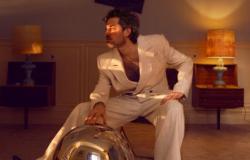More and more couples are seeking the help of specialists in assisted reproduction. In the Czech Republic, there is also interest in a method that promises to delay menopause. Will more women become mothers at an advanced age?
The field of assisted reproduction is behind many happy stories. At the same time, however, ethical questions are still associated with it. One of them sounds simple – when is it simply too late for parenting, even if technology says otherwise?
The debate in the Czech Republic was recently stirred up by the world-renowned infertility treatment expert Simon Fishel. He presented a project of freezing ovarian tissue and its subsequent transplantation in order to delay menopause. And that in 20 years.
The method originally aimed at young women who are at risk of losing fertility due to oncological treatment could thus become more available in the country as well. For example, there is talk of helping women overcome problems associated with menopause, such as the risk of osteoporosis or cardiovascular disease.
According to Štěpán Machač, chairman of the Assisted Reproduction Section of the Czech Gynecological and Obstetrical Society, the method will be used mainly to preserve certain hormonal activity, not to preserve fertility.
“It depends on where you transplant the ovarian tissue, you can transplant it into the abdominal cavity, or perhaps into the subcutaneous tissue. And I think that the main goal in the future will not be use for fertility,” says Štěpán Machač, MUDr.ování, who is also the head doctor of the Olomouc IVF Clinic, in the podcast.
“It’s an invasive procedure where you need to operate on the woman. It’s a successful method and it’s not that difficult. On the other hand, we do not want to support ladies to delay pregnancy until, for example, 45 years. We want them to give birth before the age of 40 if possible. It is also related to health complications,” he adds.
According to him, the ethical limits associated with assisted reproduction will continue to be maintained. Today, doctors in the Czech Republic are allowed to perform assisted reproduction methods on women up to their 49th birthday.
Guest MD: Štěpán Machač
Who were we talking to? MD Štěpán Machač, Ph.D. is the head doctor of the IVF Clinic in Olomouc. He is a graduate of the Faculty of Medicine of the Palacky University in Olomouc – majoring in general medicine. He is certified in reproductive medicine and holds certification I. and II. degree in gynecology and obstetrics.
He gained his experience, for example, as an IVF specialist at the reproductive clinic Reprofit International or at Unica Brno. He completed internships abroad in Cambridge, Great Britain, and in Orense, Spain.
Photo: List of News
Štěpán Machač, Chairman of the Assisted Reproduction Section of the Czech Gynecological and Obstetrical Society.
Delayed motherhood
In the Czech Republic, about 4,500 children are born each year thanks to assisted reproduction. However, the number of couples seeking professional help with conceiving a child is increasing. As well as cycles of assisted reproduction. According to Štěpán Machač, around 15 to 20 percent of the population now has problems with conception.
When it comes to reproduction, nature has a stricter gauge on women than on men. They are born with a certain number of eggs, the quality and number of which decrease with age. According to the expert, from a social and biological point of view, the optimal age for conception in a woman is about 22 to 32 years old. The statistics are inexorable in this regard.

“If a 25-year-old woman is trying to get pregnant, she should get pregnant within five to six months. In other words, she needs five to six eggs to do it naturally. It goes without saying that the partner’s spermiogram is normal and the fallopian tubes are open. A woman who is 35 years old already needs eight to ten eggs – that is, eight to ten months. For a woman over 40, there are already 12 to 15 months. So the chances are rapidly decreasing,” the doctor explains.
According to Štěpán Machač, women who do not have a partner and are worried about their fertility in the future increasingly opt for so-called social freezing – that is, freezing eggs for the purpose of their later use. Even in this case, it is better to seek out experts as soon as possible.
“We are visited by women who are over 35 years old for the purpose of so-called social egg freezing. It’s a little late. We would need to get women who are thinking about getting pregnant and are under 35 years of age for this method. At that time, if they have, say, eight to 10 eggs frozen, the chances of a healthy baby being born from them are really high.”
How successful is assisted reproduction in the Czech Republic, what about the discussed above-standard methods that promise a higher chance of conception, and what exactly awaits couples when they visit the doctors? You can listen to the entire interview with assisted reproduction expert Štěpán Machač in the MUDr.ování podcast.
MD podcast
Interviews about the miracles of medicine with those behind them. Daniela Přádová interviews doctors and experts from various areas of healthcare. Listen to musings about all forms of health, current trends and breakthrough medical procedures every Wednesday at ProZeny.cz.
You can also listen to it on Podcasty.cz or in podcast applications such as Spotify whose Apple Podcastswhere you can also receive MUDr.
Tags: mother #60s maintain ethical limits artificial insemination expert
-







